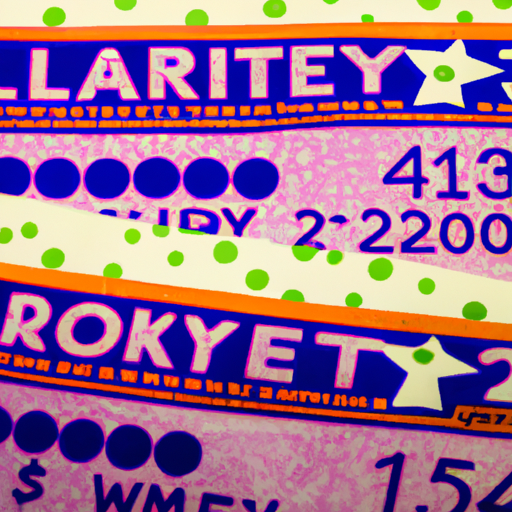Did you know that winning the lottery is not just about the jackpot amount? There’s actually a whole process behind how lottery payouts work. In this article, you will uncover the intricate details of how lottery winnings are distributed and how you can receive your prize money. From lump sum payments to annuities, this fascinating insight will give you a better understanding of the financial side of winning the lottery. So, sit back, relax, and let’s explore the intriguing world of lottery payouts together!
Lottery Payout Overview
Are you ready to claim your lottery winnings? Congratulations, you’ve hit the jackpot! But before you start planning that dream vacation or buying your dream house, it’s important to understand how lottery payouts work. In this comprehensive article, we will explore the different aspects of lottery payouts, from lump sum versus annuity options to taxation on your winnings and even protection and anonymity. So, let’s delve into the world of lottery payouts and make sure you have all the necessary information to maximize your newfound wealth!
Lump Sum vs. Annuity
Definition
When you win a lottery, you typically have two options for receiving your prize money: a lump sum or an annuity. A lump sum payout means you will receive the entire prize amount in one go, while an annuity payout involves receiving the prize money in installments over a certain period of time.
Pros and Cons
Both options have their advantages and disadvantages. Opting for a lump sum payout gives you immediate access to the entire prize money, allowing you to invest or spend it as you please. On the other hand, choosing an annuity payout provides a steady stream of income over a period, minimizing the risk of blowing through your winnings too quickly. It’s important to consider your financial goals, risk tolerance, and long-term plans before making a decision.
Prize Value Determination
Initial Prize Pool
Have you ever wondered how the prizes in the lottery are determined? The prize value is typically determined by the initial prize pool, which is set by the lottery operator. This pool consists of the funds from ticket sales, minus expenses and any predetermined allocations such as taxes and contributions to designated funds. The remaining amount is then distributed as prizes.
Ticket Sales
The amount of money people spend on buying lottery tickets directly impacts the prize pool and, subsequently, the size of the payouts. The more tickets sold, the larger the prize pool becomes, increasing the potential winnings. So, every time you purchase a lottery ticket, you contribute to the overall prize value and potentially increase your chances of scoring a larger payout.
Fixed vs. Percentage Payouts
Different lotteries have different payout structures. Some lotteries offer fixed payouts, where the amount you win is predetermined and does not change regardless of the number of winners or ticket sales. Other lotteries use a percentage payout system, where the prize amounts are determined based on a percentage of the total prize pool. Understanding the payout structure of the lottery you’re playing can help you manage your expectations and make informed decisions.
Claiming Your Prize
Time Limits
once you’ve won the lottery, there are usually time limits for claiming your prize. These time limits vary depending on the jurisdiction and the specific lottery rules. It is crucial to familiarize yourself with these time limits and ensure you claim your winnings within the specified period. Failure to do so may result in forfeiting your prize.
Identity Verification
Before you can claim your lottery prize, you will need to verify your identity. This is done to ensure the rightful owner receives the winnings and to prevent fraudulent claims. Typically, you will need to provide identification documents such as a government-issued ID, proof of address, and your winning ticket. Be prepared to go through this verification process, as it is an essential step in receiving your prize.
Publicity Options
Winning the lottery can be a life-changing event, and some individuals may prefer to keep their newfound wealth private. However, in many jurisdictions, lottery winners are required to disclose their identity as part of the public record. It’s important to understand the rules regarding publicity options in your specific lottery and jurisdiction to determine the level of privacy you can maintain.
Taxation on Lottery Winnings
Federal Taxes
When it comes to lottery winnings, taxes are an unavoidable part of the equation. In the United States, lottery winnings are subject to federal taxes. The Internal Revenue Service (IRS) treats lottery winnings as ordinary income, which means they are taxed at your individual tax rate. It’s crucial to consult with a tax advisor or accountant to understand the specific tax implications of your lottery winnings and plan accordingly.
State Taxes
In addition to federal taxes, many states also impose taxes on lottery winnings. The amount and rate of state taxes vary from state to state, so it’s important to familiarize yourself with the tax regulations in your specific jurisdiction. Some states have no state tax on lottery winnings, while others may have substantial taxes. Proper tax planning can help minimize the impact of both federal and state taxes on your winnings.
Strategic Tax Planning
to minimize the tax burden on your lottery winnings, strategic tax planning is essential. This may involve seeking professional advice from tax experts, exploring legal tax shelters, or considering philanthropic contributions that can generate deductions. Understanding the tax implications and seeking professional guidance can help you make the most of your lottery windfall.
Protection and Anonymity
Trusts and LLCs
If maintaining privacy and protecting your identity is important to you, establishing a trust or a limited liability company (LLC) can offer a viable solution. By claiming your lottery winnings through a trust or LLC, you can avoid publicly disclosing your personal information. However, it’s important to note that the rules and regulations regarding trusts and LLCs vary by jurisdiction, so it’s crucial to consult with legal and financial professionals to ensure compliance with the law.
Claiming Anonymously
while some states allow winners to claim their prizes anonymously, others require public disclosure of winners’ identities. If anonymity is important to you, research the specific laws and regulations in your state to determine if you have the option to claim your prize without public disclosure.
States with No Anonymity
It’s worth noting that several states do not allow winners to remain anonymous. If you live in one of these states, winning the lottery may result in the public unveiling of your newfound wealth. Understanding the anonymity laws in your state can help you make informed decisions and explore alternative methods to protect your privacy.
Payout Processing and Options
Validation Process
Upon claiming your prize, the lottery operator will initiate a validation process to ensure the authenticity of your winning ticket. This process involves verifying the ticket, conducting background checks, and confirming your eligibility to claim the prize. The validation process is crucial to maintain the integrity of the lottery and ensure only legitimate winners receive their payouts.
Payout Methods
Once your winning ticket is validated, you will have various options for receiving your lottery payout. These options typically include a lump sum payment or an annuity payout. Some lotteries may also offer additional payout options, such as structured settlements or installment payments. It’s important to understand the available payout methods and choose the one that aligns with your financial goals and personal preferences.
Direct Deposit vs. Check
When it comes to receiving your lottery payout, you may have the choice between direct deposit and a physical check. direct deposit offers the convenience of having your winnings directly deposited into your bank account, allowing for quicker access to your funds. Alternatively, you can opt for a physical check, which provides a tangible representation of your winnings. Consider your personal preferences and banking convenience when deciding between these two options.
Unclaimed Lottery Prizes
Time Limits to Claim
Believe it or not, there are instances where lottery prizes go unclaimed. This can happen if winners fail to come forward within the designated time limits. Each lottery has specific time limits for claiming prizes, which are outlined in their rules and regulations. It’s important to be aware of these time limits and ensure you claim your prize within the specified period to avoid losing out on your winnings.
Distribution of Unclaimed Prizes
In the event of unclaimed lottery prizes, the distribution process varies depending on the jurisdiction. Some states allocate unclaimed prize money to education funds, public services, or other designated areas. Others may use the unclaimed funds to increase future prize pools or for other purposes. Understanding the policies surrounding unclaimed lottery prizes can help you appreciate how these funds are utilized for the greater good.
Lottery Scams and Safety
Common Scams
With the excitement surrounding lottery winnings, scammers often try to take advantage of unsuspecting winners. Common lottery scams include individuals posing as lottery officials, requesting fees or personal information to process the prize, or claiming that you’ve won a lottery you never entered. It’s crucial to be vigilant and wary of any unsolicited communication regarding your lottery winnings.
Red Flags
While lottery scams can be sophisticated, there are often red flags that can help you identify them. Be cautious if you receive a communication claiming you’ve won a lottery you never entered, if you’re asked to pay fees or taxes upfront to claim your prize, or if the communication is filled with grammatical errors or unusual email addresses. If something feels off or too good to be true, it’s important to question and verify before taking any actions.
Reporting Scams
If you encounter a lottery scam or believe you’ve been targeted by fraudsters, it’s crucial to report the incident to the appropriate authorities. Contact your local law enforcement agency, your state lottery organization, or the Federal Trade Commission (FTC) to report the scam and provide them with any relevant information. Reporting these scams helps protect others and contributes to the fight against lottery fraud.
Conclusion
Understanding the ins and outs of lottery payouts is essential for any lucky winner. From choosing between a lump sum and annuity payout to navigating the taxation process and protecting your privacy, there are numerous factors to consider. By familiarizing yourself with the information provided in this comprehensive article, you’ll be well-equipped to make informed decisions, safeguard your winnings, and fully enjoy the fruits of your lottery success. Good luck and may your wins be as bountiful as your dreams!






